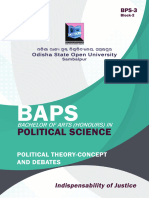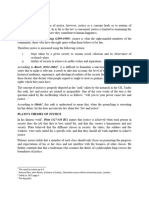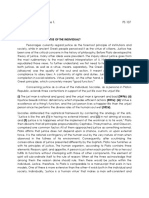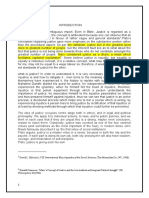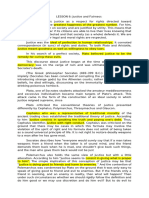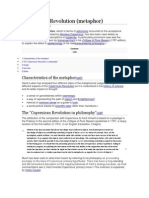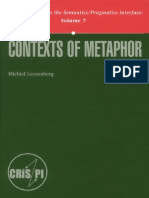22 Ijrg19 A01 2055 PDF
22 Ijrg19 A01 2055 PDF
Uploaded by
anilaCopyright:
Available Formats
22 Ijrg19 A01 2055 PDF
22 Ijrg19 A01 2055 PDF
Uploaded by
anilaOriginal Title
Copyright
Available Formats
Share this document
Did you find this document useful?
Is this content inappropriate?
Copyright:
Available Formats
22 Ijrg19 A01 2055 PDF
22 Ijrg19 A01 2055 PDF
Uploaded by
anilaCopyright:
Available Formats
[Yasmin et. al., Vol.7 (Iss.
1): January 2019] ISSN- 2350-0530(O), ISSN- 2394-3629(P)
DOI: 10.5281/zenodo.2550673
Social
THE RELATIONSHIP BETWEEN JUSTICE AND RATIONALITY IN
ANCIENT, MEDIEVAL AND MODERN ERA: A CRITICAL
INVESTIGATION OF MACINTYRE’S CONCEPTION
Anila Yasmin *1, Riffat Iqbal 2
*1
M.phil Scholar, Department of Philosophy, Bahauddin Zakariya University, Multan, Pakistan
2
Assistance Professor in the Department of Philosophy, BZU, Multan, Punjab, Pakistan
Abstract
The present study aims to explore the nature of justice and rationality and a relationship between
them that how it has become a base for any society and culture in ancient, medieval and modern
age. And how different thinkers present rival and compatible views about justice and rationality
and how they both impact in our society. Any society benefits from having justice as a prevailing
virtue. This helps ensure that wrongs will be ended and rights will be upheld thereby leading to a
safer society for everyone. Its strong relation with virtues maintains that it cannot uphold without
the presence of virtues. The most basic virtue is rationality without which no justice is possible.
Different thinkers in ancient medieval and modern times give different views about the relationship
between justice and rationality. But Macintyre holds that there is no neutral conception of justice
but there are different standards of justice and rationality in every society.
Keywords: Justice; Rationality; Macintyre’s Concepts; Ancient; Medieval and Modern Concepts
of Justice and Rationality.
Cite This Article: Anila Yasmin, and Riffat Iqbal. (2019). “THE RELATIONSHIP BETWEEN
JUSTICE AND RATIONALITY IN ANCIENT, MEDIEVAL AND MODERN ERA: A
CRITICAL INVESTIGATION OF MACINTYRE’S CONCEPTION.” International Journal of
Research - Granthaalayah, 7(1), 251-259. https://doi.org/10.5281/zenodo.2550673.
1. Introduction
Justice is a broad notion that is based on a concept of moral rightness. Justice has different
conception in every culture. It is the result of distinct methodologies, religion and histories that
justice has rival and incompatible concepts. On the other hand rationality aware an individual that
all his instinctive and judgments in which he believe are either justified or not. A British
philosopher Alasdair Macintyre presented the concepts of four traditions (Aristotelian,
Augustinian, Humean and Thomists) about justice and its relationships with practical rationality.
The differing accounts of justice and rationality which are presented by Aristotle, Augustine,
Aquinas and Hume, different in their conceptual scheme.1 These traditions bared a lot of criticism.
Http://www.granthaalayah.com ©International Journal of Research - GRANTHAALAYAH [251]
[Yasmin et. al., Vol.7 (Iss.1): January 2019] ISSN- 2350-0530(O), ISSN- 2394-3629(P)
DOI: 10.5281/zenodo.2550673
Macintyre defines, In Whose Justice? Which Rationality, a tradition a “A concept of rational
inquiry ... according to which the standards of rational justification themselves emerge from and
are part of a history in which they are vindicated by the way in which they transcend the limitations
and provide remedies for the defects of their predecessors within the history of that same
tradition”.2
2. Ancient Era and Criticism
We start from ancient traditions of Plato who followed Socrates by concluding about justice that:
“A just soul and a just man will live well, and an unjust one badly … a just person is happy, and
an unjust person wretched.” 3 Macintyre holds that according to Plato, justice is nothing but what
the strong make it. Those who lack justice will not only fail in excellence by the standard of virtue,
but they also fail in respect of effectiveness, a failure which they unable to understand correctly. 4
Macintyre maintains that one cannot become just, on Aristotle's viewpoint, without the ability to
reason practically.5
Frank, De Vita said that, Plato’s concepts of justice are based on the emotion itself, while Aristotle
concepts rest on action and virtue. He said that, to be Platonically just, an agent should be rationally
control of their desires. On the other hand Aristotle maintains that to attain the state of justice an
individual should have practical wisdom. So through practical wisdom an individual attain the
balance between their spirited emotions and appetitive desires to develop Aristotelian virtues. Thus
the Platonic and Aristotelian just individuals are consistent and describe in harmony with each
other6
David Johnston (1941) explains that, according to Plato the purpose of justice is the
accomplishment of wisdom, and an explanation of accurate associations of power and duty. On
the other hand in contrast Aristotle argued that above all the thought of justice concerns to
associations between men who are free and equal and who have different abilities, which allow
them to contribute to the political society in diverse ways.7Another thinker Karl Popper maintains
that, according to Plato a society will be just if the individuals of that society will sacrifice their
needs for the sake of the city. He holds that according to Plato justice is health, stability and the
unity of the collective body, nothing more 8. Thus this is extremely dangerous in Popper’s
perspective. According to Popper, the state and other social institutions designed by human are
subject to rational inquiry and that are serving the interests of individuals. He was against the
Plato’s organistic view that justice is what in which the functioning of state will be in proper way,
while on the other hand Popper argued that a proper justice is based on equal treatment of
individuals. The Popper emphasize on the view of libertarianism to a large extent. He focuses on
the individual freedom that is the most significant political value. He said that through equality
one can lead to totalitarianism. But his main focus was towards freedom and said that its value is
greater than equality because equality put freedom in dangers 9. Karl Popper argued that Plato’s
concept of an ideal state is totalitarian while Popper’s own view is libertarian.
So, it is concluded that Plato's theory of Justice is idealistic in nature. And it also comes to us that,
both Plato and Aristotle think that a just person would have a much more righteous and successful
life. But there are many fruitful people who attained their achievement through unjust habits.
Http://www.granthaalayah.com ©International Journal of Research - GRANTHAALAYAH [252]
[Yasmin et. al., Vol.7 (Iss.1): January 2019] ISSN- 2350-0530(O), ISSN- 2394-3629(P)
DOI: 10.5281/zenodo.2550673
3. Medieval Era and Criticism
A.Y. “Fred” Ramirez explains, Like Aristotle, Aquinas defines justice as a rendering-to-each- his-
due: "Now each man's own is that which is due to him according to equality of proportion.
Therefore the proper act of justice is nothing else than to render to each one his own" (ST, SS, Q.
58, Art. 11).. Aquinas names justice as a cardinal virtue, of which mercy, liberality, and pity are
secondary in the sense that justice would encompass them all. He distinguishes between
“commutative justices” from “distributive justice” in the following way: the former refers to the
manner in which one individual interacts with another, privately, whereas the latter refers to the
manner in which a community acts towards a single person in the way it distributes,
proportionately, common goods, such as titles, resources, rights, opportunities. (Q61, Art. 1).
Aquinas goes on to argue that favoritism is opposed to distributive justice—that justice should be
meted out according to the merits of a cause—and he illustrates this with the example of offering
a professorship: it would be unjust to offer a position to someone simply because he is a particular
man (e.g., Peter); rather, justice requires, by nature of the cause in question, that the position be
offered on the merits of the person’s knowledge.10
Gottfried Wilhelm Leibniz’s (1646-1716) was impressed by Aquinas and Aristotle and in practical
rationality he adds the pluralism of values and the theory of estimating the possibilities of the
outcome of recommended actions. According to him the distinct aspect of practical rationality is
that the best rational choice which is the best of all the other world’s choices is the divine rational
choice, which is the choice of God. In kind, divine and human thought are parallel and in degree
they are different. It is natural for men to make mistakes to approach to the goods, for him the real
good is that which is in front of him. On the other hand God choose the real good. Thus in good
moral conduct the correct moral reasoning is important. Though, if the moral act is based on
reasoning within the limits of the abilities of the person concerned, it will be rational. In other
words, men are able to deliberate rationally whether or not their moral judgments are accurate.11
David Berge argued that, on several points Augustine and Aristotle differ: Augustine holds that
the city of God (Civitas Dei) is all-embracing, while for Aristotle who is not the citizen of a specific
polis, he will be excluded from that polis. Augustine’s believed that the chief virtues are humility
and charity while on the other hand Aristotle denies his notion of virtues that is based on humility
and charity. Augustine believes on the authority of will which do right acts while Aristotle
maintains that there is no any will as such. And Augustine’s telos is God himself while Aristotle’s
telos exist in the city of Man. Thus, their schemas were dissimilar at a large extent. But it was
Thomas Aquinas in the 13th century who brings the thoughts of Aristotle and Augustine together.12
Thomas’ view holds that only the laws of God are the source of justice that, without virtues there
is no justice and without grace there is no virtue. According to him our society will be called
rational and the just society if it will beyond the comprehension of God. 13
Macintyre express that both for Aristotle and Aquinas, rational justification is a matter of
deducibility from first principles, in the case of derived assertions and of the self evidentness as
necessary truths of those same first principles.14 He holds that the statement of Aquinas is logical
and justifiable, as it come outs from the complex arguments that are considered more than
Augustine and Aristotle.15
Http://www.granthaalayah.com ©International Journal of Research - GRANTHAALAYAH [253]
[Yasmin et. al., Vol.7 (Iss.1): January 2019] ISSN- 2350-0530(O), ISSN- 2394-3629(P)
DOI: 10.5281/zenodo.2550673
Paul J. Weithman 16argue that the central difference between the two thinkers lies in the dissimilar
values each assigns to citizens attachment to the common good. Thus, the Thomist holds that it is
through our moral development that we are able to apply the first principle.
Another thinker Hans Kelsen elaborate the view of utilitarian’s in his theory of justice that,
according to them, the goal of each person is chiefly the elevations of agents own happiness.
Macintyre holds that: All utilitarian doctrine which prescribe that everyone is to count for one, that
everyone desires are to be weighed equally in calculating utility and, what it, right, from Bentham
to contemporary utilitarian’s and egalitarians, are deeply incompatible with Aristotle’s standpoint.
For what those deprived of the justice of the polis want cannot provide any measure for justice”.17
Kelsen believed that law can be separated from what is just or morally right. A law is still a law
and should be obeyed even if it is completely immoral. He concludes rightly that it is impossible
to define justice scientifically and if reasonably any concept of justice emerges than it will be
establish on emotive premises. He holds that justice is irrational ideal that highlight the preferences
and values of individuals.
4. Modern Era and Criticism
In modern perspectives the philosophy is not moral but it is technical. John Rawls (1921- 2002)
who was also a communitarian was opposed to the concept of utilitarian’s and argued that the
utilitarian’s reserve freedom and political rights and the freedom of everyone, they maintain that
by doing so they are helping to promote society. He gives two principles of justice to form a better
society: The “First Principle” maintains that society should guarantee every individual of a city
equal fundamental rights and freedom to achieve these rights, towards which all individual can
approach equally. 18 It is also called the principle of liberty. And the other is called different
principle in which the fair distribution which deals with the organizations, opportunities, income
and possessions introduced. Rawls' description of distributive justice in his defense of
libertarianism, is criticized by Nozick. According to Nozick the means are created by people and
they have full right upon things which they produce. Thus, the distribution of the least advantaged
will be unjust because it is often seen that people do not work willingly for others, for the reason
that they do not want share equally those things which they produce with a great struggle. 19
Michael Sandel criticized Rawls and argued that Rawls supports people to sense about justice
while separated from the values and targets that define who they are as persons and that permit
people to find out what justice is.20Amartya Sen raised objection by arguing that we should focus
not only to the distribution of possessions, but also how well the individuals are capable of utilize
those possessions to achieve their goals.21Against Rawls, Cohen argued that any unequal
distribution of possessions is unjustified. He was in opposition to Rawls and holds that the rich are
already gifted with talent, advantaged childhood, and objective. So Cohen said that if we will
gratify them more with material possessions then it means we are gratifying them twice, which
will not be just 22.
Http://www.granthaalayah.com ©International Journal of Research - GRANTHAALAYAH [254]
[Yasmin et. al., Vol.7 (Iss.1): January 2019] ISSN- 2350-0530(O), ISSN- 2394-3629(P)
DOI: 10.5281/zenodo.2550673
4.1. Hume and Hutcheson
In Stephen Darwall views, Hutcheson holds that a person makes efforts to achieve a goal and to
achieve the goal which an action requires is practical truth. He argued that rational beings are those
that have concern for the good of others and their own good.23
According to Richard, Hutcheson was religious in his beliefs and holds that it is through human
reason and understanding that we could apprehend the world’s reality in which we live, and can
judge the condition of institutions. He said that reason urges us to find out that what is the purpose
and mission of God to create human beings and other creature on earth. Thus he believed that man
has an intuitive moral sense which is his hidden potentiality. 24
About “reason” Hume argued that it is a faculty through which we discover the truths of the world.
In Hume’s perspective reason is not practical. 25 Millgram argued that, as Hume maintains that
reason is not practical but his account has a “null hypothesis” that rational and irrational actions
cannot exists. Elijah Millgram, Christine Korsgaard and Jean Hampton, argued that Hume is
merely a denial of a practical rationality but it does not mean that he is an anti-rationalist 26. Hume’s
account, as Macintyre holds, require a very diverse kind of context, that the goal of a society is
based on the fulfillments of desires, in which reciprocal are organized for their interactions.27
According to MacIntyre, Reid criticize David Hume that the use of rationality whether it will be
practical or theoretical requires no any specific kind of social order. We are spending our lives in
the world in which the matter of practical rationality is personified in those social contexts that are
continuously under the conflicts and disagreements 28.
JOSEPH GRCIC (1865-1943) said that, according to Hobbes justice means acting upon the
contract and injustice is any violation of the contract that is done through the ruler. Hobbes
maintains that some political philosophers for example Aristotle put forward that the ruler cannot
be divided into dissimilar authorities. For Hobbes, a separation is impossible between legislative
judiciary and executive power because to resolve the clash between them requires a supreme
authority which will be the authority of a ruler. Hobbes’ concept of the contract maintains that this
contract generate lawful and moral obligations. He said that no contract exists among a ruler and
the individuals, and to the supreme ruler there are no moral and legal boundaries. He maintains
that a ruler has the power to take the possessions of people, to tax, to makes law, to the appointment
of judges, give reward or punish and make war and peace and anything he wants in his state, while
on the other hand people have no rights expect the right of self preservation. The liberty of self
preservation is the liberty that people are in opposition to the ruler. People will protest for another
ruler if the existing ruler will not protect them and make injustice to the people. 29
Paul Weirich (1946) argues that, the evaluation of a rationality of an act depends upon the
circumstances and abilities of an individual. Its demands adjust to them. When the circumstances
are not in favor of him, it decreases its demands. For example, when the time for a decision is
short, it may close the eyes to top options. Rationality is bounded, in common language. And it is
attainable in its specific term. Some options are rational in facing the problem of every decision.
An option that is rational will be sustained by good reason than any other option. But some options
are not equally rational and equally sustained by reason. At least one option is rational, because
Http://www.granthaalayah.com ©International Journal of Research - GRANTHAALAYAH [255]
[Yasmin et. al., Vol.7 (Iss.1): January 2019] ISSN- 2350-0530(O), ISSN- 2394-3629(P)
DOI: 10.5281/zenodo.2550673
rationality is attainable and be suitable for all appropriate doctrines of rationality. In an ideal
decision, the rule to maximize utility applies while on the other hand the principle of satisfying
may apply in a non ideal problem. Some options make best use of utility and therefore are rational
but some options are satisfactory and as a result are rational yet if that are unsuccessful to make
best use of utility. Such as, a chess player may rationally make a satisfactory but non-optimal
move, having unsatisfactory strategic reasoning command. An individual who is rational follow
the goals of rationality in a reasonable way even if their achievement becomes difficult through
the obstacles. Thus, in pursuing the primary goal of successful action, rationality helps a lot and
put forward the best ways.30
Immanuel Kant who was a German idealist holds that all individuals have rights and they can act
freely what they want, and according to the universal law everyone has freedom. But it does not
mean that we should hurt others or destroy the rights of others. In this way the Kant’s universal
law of justice emerged that is called the categorical imperative: in which he assume that an action
will be just if in which the freedom of an individual coexist jointly with the freedom of the other
according to those law that is universal.
According to Chloe Doss & Kara Delemeester, Kant follows the libertarian’s view of justice that
if the distribution comes from the free exchange of goods then the distribution of possessions will
be just. Kant denies the concept of Utilitarianism. He maintains that the aim of a just organization
is harmonize every person’s freedom with others. 31
Alasdair Macintyre is a major critic of the Enlightenment and modernity, particularly as it appears
in Kant’s philosophy. He presents that Kant holds a negative view about the relation between
practical rationality and human interests and attachments. In his view, human beings should adopt
a neutral stance in identifying moral duties, using pure practical rationality.
Macintyre, on the contrary, holds that there is no practical reasoning capacity for human beings
independent of his training and upbringing in moral traditions. Human beings should acquire moral
virtues by following moral exemplars before being able to reason about them.
5. Macintyre’s Conception about Justice and Rationality
For moderns, all our thoughts are not based on traditions and that every culture has their own
criteria’s of justice and rationality. They hold that there is no place for traditions that is essential
for moral and political investigations. Thus, Macintyre argued that these traditions off course
different from each other over much more than their contending accounts of justice and practical
rationality: they differ in their catalogues of virtues, in their conceptions of selfhood, and in their
metaphysical cosmologies. 32
For Macintyre, we can make no any argument or no any enquiry that is possible without a specific
type of tradition. That is called “the rationality of traditions” by Macintyre 33. He distinguishes two
related challenges to his position, one is the “relativist challenge” and other is the “perspectivist
challenge.” According to him, relativism is the concept that in a specific tradition rationality and
ethics will be valid and it will not be devaluated outside that tradition. Since every tradition is
superior as others. In contrary, perspectivism is the view that rationality and ethics of a specific
Http://www.granthaalayah.com ©International Journal of Research - GRANTHAALAYAH [256]
[Yasmin et. al., Vol.7 (Iss.1): January 2019] ISSN- 2350-0530(O), ISSN- 2394-3629(P)
DOI: 10.5281/zenodo.2550673
tradition will be valid only in the perspective of a given tradition. These two perspectives holds
that, in any tradition of thought validity and truth is impossible. Both perspectives hold that the
criteria’s of rationality are available in traditions and they agree on this point that nothing can be
considered right or wrong without any traditional concern.
Professor Macintyre arguing that: “No tradition can claim rational superiority to any other. For
each tradition has internal to itself its own view of what rational superiority consists in, regarding
such topics as practical rationality and justice, and the adherents of each will judge accordingly”.34
Thus there is no single concept of rationality but rationalities and no single concept of justice but
justices 35.According to Macintyre no any idea or ideas of practical rationality and justice that is
outside any other tradition, in which our moderns are confused 36. He holds that the ethical concepts
are unchangeable and absolute and that are linked with practical rationality. Hence the world in
which we are moving is continuously in conflict with the circumstances in which practical
rationality and justice are exemplified.
6. Conclusion
Macintyre presents four traditions regarding justice and rationality. After the analysis of different
traditions it is concluded that the Thomists tradition is quite well than others. Aristotelian tradition
treats equals equally, unequals unequally which is not a good deal because it is often seen that the
individuals who do not make just acts can achieve more than those who perform just acts. In this
way a great gap occur among people and society because the concept of hard work will not sustain
too long if people achieve what they want effortlessly. The views of Mill, Rawls and Kant are not
satisfactory. Rawls focus on the equality on the whole level which is an unjust act because in this
way the people who are poor just satisfy their basic needs and the richer become richer if they are
granted twice. So, there is a big difference occurs among society and their members if we accept
his view. According to utilitarian’s the concept of justice is to promote happiness at maximum
level. But it is concluded that in this way we can exclude the minorities of the society that will be
unjust and irrational. As they focus on the welfare of the individuals rather than society it is not
just. Kant accepts the person’s freedom in his rational judgments. His view is liberal. But sometime
this freedom leads us towards wrong decisions though which we intentionally or unintentionally
hurt others and make decisions that are not helpful to us in future. In Humean tradition as it is seen
earlier that they do not accept rationality. Hume adopts from Hutcheson the view that we are under
our passions control. Thus, it is concluded that where there is no rationality there is no justice
because through passions we cannot make valid or true judgments.
If we see the Thomist tradition that holds that our good reasoning is not possible without moral
virtues (prudence, courage, justice, temperance). When these will be in harmony we can reason
well and we can judge well and if they will be in contradiction then we can neither reason well nor
judge well. Thus, it is concluded that we should follow the Thomist tradition to construct a good
society and promote justice in the society and these virtues helps us in maintain that what we ought
to do or not to do.
Http://www.granthaalayah.com ©International Journal of Research - GRANTHAALAYAH [257]
[Yasmin et. al., Vol.7 (Iss.1): January 2019] ISSN- 2350-0530(O), ISSN- 2394-3629(P)
DOI: 10.5281/zenodo.2550673
References
[1] Alasdair MacIntyre, "Précis of Whose Justice? Which Rationality?" (Philosophy and
Phenomenological Research.1991). 51 (1): 149–152.
[2] Alasdair MacIntyre, Whose Justice? Which Rationality? (Notre Dame, IN: Univerity of Notre
Dame Press, 1988), p.7
[3] Plato. “The Republic”, (G. M. A. Grube, Trans.). (Indianapolis: Hackett Publishing Company,
1992); p. 353e-354a.
[4] WJWR; p. 70
[5] Ibid; p.123
[6] Frank, De, Vita.“Plato and Aristotle compared”.Retrieved on 02-09-2017.
https://frankdevita.wordpress.com/2012/08/06/plato-and-aristotle-compared/
[7] Karl Raimund Popper, The Open Society and Its Enemies, (George Routledge & sons, ltd. 1947)
Volume 1; p.106.
[8] David Johnston, A Brief History of Justice (Wiley-Blackwell, 2011); vol.10.265.
[9] Karl Popper, “Unended Quest”: An Intellectual Autobiography (Routledge Classics :1976); 36.
[10] Reading Notes. Whose Justice? Which Rationality? (part 7, Augustine). Retrieved 10-2-17.
http://davidberge.com/?p=155
[11] Reading Notes. Whose Justice? Which Rationality? (part 8, Aquinas). Retrieved 10-2-17.
http://davidberge.com/?p=158
[12] A.Y. “Fred” Ramirez, Western Philosophical Conceptions of Justice. Biola University retrieved
from media.biola.edu/jsejournal/downloads/.../western-philosophical-conceptions-justice.pdf...
[13] Markku Roinila (2016). Leibniz on Rational Decision-Making,University of Helsinki.p.162
[14] WJWR; p.172-173
[15] Ibid;p.205
[16] Paul J Weithman, "Augustine and Aquinas on Original Sin and the Function of Political Authority."
Journal of the History of Philosophy (The Johns Hopkins University Press.1992)30: 353-76.
[17] WJWR; p.98
[18] John Rawls, Political Liberalism (New York: Columbia University Press, 1993); p. 5.
[19] Robert Nozick, Anarchy, State, and Utopia (Oxford: Blackwell Publishers, 1993). Pp; 183–231.
[20] Michael Sandel, Liberalism and the Limits of Justice (New York: Cambridge University Press,
1998); p. 14.
[21] Amartya Sen, Inequality Reexamined (Cambridge, MA: Harvard University Press, 1992); p.207.
[22] Nanhee Byrnes. “What are the main differences between Nozicks and Rawls political economic
theories”? Retrieved on 02-11-2017. https://www.quora.com/What-are-the-main-difference-
between-Nozicks-and-Rawls-political-economic-theories
[23] Stephen Darwall. “Hutcheson on Practical Reason”. Retrieved 02-14-2017.
www.humesociety.org/hs/issues/v23n1/darwall/darwall-v23n1.pdf
[24] Richard M. Ebeling. “Francis Hutcheson and A System of Natural Liberty”. Retrieved 02-05-2017.
https://fee.org/articles/francis-hutcheson-and-a-system-of-natural-liberty/.
[25] A Progress of Sentiments (Cambridge, MA: Harvard University Press, 1991); 277-8.
[26] Michelle Mason, "Hume and Humeans on Practical Reason" (Hume Studies, 2005); Volume 31,
Number 2: pp. 347 - 378.
[27] WJWR; p.298
[28] WJWR; p.325
[29] Kara Delemeester. “Justice Chapter 5, Immanuel Kant”. (Accessed 02-12-2017),
https://prezi.com/kzokywmok9e5/justice-chapter-5-immanuel-kant/.
[30] WJWR; p.349
[31] Francis Hutcheson, A System of Moral Philosophy (London: University of London, 1755); vol II,
xvii, 5
[32] WJWR; p.348
Http://www.granthaalayah.com ©International Journal of Research - GRANTHAALAYAH [258]
[Yasmin et. al., Vol.7 (Iss.1): January 2019] ISSN- 2350-0530(O), ISSN- 2394-3629(P)
DOI: 10.5281/zenodo.2550673
[33] JOSEPH GRCIC (2007). Hobbes and Rawls on Political Power, Indiana State University .journal
of Ethics & Politics, IX, , 2, pp. 371-392
[34] Paul Weirich (2012). Collective acts. Synthese, Vol. 187, No. 1, MORE FOUNDATIONS OF THE
DECISION SCIENCES, pp. 223-241 https://www.jstor.org/stable/41494958
[35] Ibid; p.9
[36] Bernard Williams, Modernity, Vol. 11 No. 1: pages 5-6. Retrieved 1-21-2017.
https://www.lrb.co.uk/v11/n01/bernard-williams/modernity.
*Corresponding author.
E-mail address: anilayasmin4@ gmail.com
Http://www.granthaalayah.com ©International Journal of Research - GRANTHAALAYAH [259]
You might also like
- TeleologicalDocument6 pagesTeleologicalLeiya Lansang100% (3)
- Tok LessonsDocument3 pagesTok Lessonscaitlin hurley100% (1)
- Law and Justice in A Globalizing World Sem 1Document25 pagesLaw and Justice in A Globalizing World Sem 1Shailja LLM 2021100% (1)
- Rey Ty. (2010) - Education For Justice. Proceedings of The Midwest Research To Practice Conference. East Lansing, MI: Michigan State University.Document6 pagesRey Ty. (2010) - Education For Justice. Proceedings of The Midwest Research To Practice Conference. East Lansing, MI: Michigan State University.Rey Ty 郑 文华No ratings yet
- Philosopher Concept About Self My Concept About Self: SocratesDocument1 pagePhilosopher Concept About Self My Concept About Self: SocratesJamaella Sofia CaloNo ratings yet
- Thomas Nagel - Equality and Partiality PDFDocument122 pagesThomas Nagel - Equality and Partiality PDFGarima Goswamy100% (1)
- A Practitioners Guide To Rational Emotive Therapy First Edition PDFDocument324 pagesA Practitioners Guide To Rational Emotive Therapy First Edition PDFRicardo Moncada100% (4)
- Obs Inf Worksheet 2013Document2 pagesObs Inf Worksheet 2013api-338002331100% (1)
- 328-Article Text-608-2-10-20210920Document17 pages328-Article Text-608-2-10-20210920Shweta KumariNo ratings yet
- Justice As A ConceptDocument12 pagesJustice As A ConceptNikhil HansNo ratings yet
- Polsci Assignment Sem-2Document19 pagesPolsci Assignment Sem-2TanishaNo ratings yet
- Law, Justice and GlobalisationDocument18 pagesLaw, Justice and GlobalisationSRINIVASA RAO KARRANo ratings yet
- Justice Justice Is The Concept Of: BenevolenceDocument6 pagesJustice Justice Is The Concept Of: BenevolenceSidra FahimNo ratings yet
- An Appraisal of Justice in Pakistan From The Prism of Platonic JusticeDocument10 pagesAn Appraisal of Justice in Pakistan From The Prism of Platonic Justiceusama_yasinNo ratings yet
- The Concept of Justice in Greek Philosophy Plato ADocument15 pagesThe Concept of Justice in Greek Philosophy Plato AAGUIRRE Christian Jude D.No ratings yet
- Order 8Document5 pagesOrder 8J KNo ratings yet
- In Philosophy, It Is "The Science or Doctrine That Attempts To Explain The Universe in Terms of Ends or Final Causes"Document2 pagesIn Philosophy, It Is "The Science or Doctrine That Attempts To Explain The Universe in Terms of Ends or Final Causes"Delsie FalculanNo ratings yet
- Western Theories of JusticeDocument41 pagesWestern Theories of Justiceestudosdoleandro sobretomismoNo ratings yet
- 11 - DR.S K Gupta Concept of Environmental JusticeDocument37 pages11 - DR.S K Gupta Concept of Environmental JusticePritam KumarNo ratings yet
- Baps 03 Block 02Document35 pagesBaps 03 Block 02suman kalyan DashNo ratings yet
- Justice Is A Concept Of: o o o o o o o o o oDocument10 pagesJustice Is A Concept Of: o o o o o o o o o oInamullah KhanNo ratings yet
- SOCIAL JUSTICE DAY 2016 SHORT Copy (1Document25 pagesSOCIAL JUSTICE DAY 2016 SHORT Copy (1Melissa KhevarliNo ratings yet
- John Rawls Theory of JusticeDocument5 pagesJohn Rawls Theory of JusticeKritika RastogiNo ratings yet
- JURIS Assign 1Document6 pagesJURIS Assign 1Cream MelodiesNo ratings yet
- WP 1Document4 pagesWP 1api-384228503No ratings yet
- The Concept of Justice: ChapterDocument41 pagesThe Concept of Justice: Chapterزهرة الزنبق زهرة الزنبقNo ratings yet
- Aristotle and Plato On JusticeDocument2 pagesAristotle and Plato On JusticeSuyash RaoNo ratings yet
- Justice JusticeDocument22 pagesJustice JusticeAfolabi QauzeemNo ratings yet
- Kinds of JusticeDocument25 pagesKinds of JusticemurkyNo ratings yet
- Chapter 1Document48 pagesChapter 1Aryan AnsariNo ratings yet
- Theories and Concept of JusticeDocument66 pagesTheories and Concept of JusticeSahil SafdarNo ratings yet
- Justice and Its KindDocument33 pagesJustice and Its KindGabriela StevensNo ratings yet
- Book Review - Jurisprudence. The Philosophy and Method of The Law: Harvard University PressDocument5 pagesBook Review - Jurisprudence. The Philosophy and Method of The Law: Harvard University PressSaubhagyaNo ratings yet
- Theory of JusticeDocument3 pagesTheory of Justicelynnmonica133No ratings yet
- What Is The Relationship Between Justice and Law?Document3 pagesWhat Is The Relationship Between Justice and Law?zephyryuNo ratings yet
- Moral Foundations of Private Law - GordleyDocument25 pagesMoral Foundations of Private Law - GordleyjefersonclsantosNo ratings yet
- Concept and Meaning of Law Week 1Document6 pagesConcept and Meaning of Law Week 1harshit tiwariNo ratings yet
- H.P National Law University, Shimla: Assignment of "Legal Methodology" Topic: Dimension of Justice: An OverviewDocument12 pagesH.P National Law University, Shimla: Assignment of "Legal Methodology" Topic: Dimension of Justice: An OverviewKushagra SrivastavaNo ratings yet
- Concept of Justice and Its Different FacetsDocument39 pagesConcept of Justice and Its Different FacetsKumar Spandan100% (1)
- Project IN Prelim: "Common Ethical Ethics"Document10 pagesProject IN Prelim: "Common Ethical Ethics"Mae Nardeliza Saren PondocNo ratings yet
- JurisprudenceDocument50 pagesJurisprudenceIzuora EdNo ratings yet
- 01 BhandariDocument42 pages01 Bhandariزهرة الزنبق زهرة الزنبقNo ratings yet
- Aristotle Thoery of JusticeDocument1 pageAristotle Thoery of Justicexee shanNo ratings yet
- Bernardo, Rhona Jane F. Ps 107 Abps 2ADocument3 pagesBernardo, Rhona Jane F. Ps 107 Abps 2ARhona Jane BernardoNo ratings yet
- JusticeDocument6 pagesJusticemkreddy6989No ratings yet
- Teleological School of Thought - FINALDocument15 pagesTeleological School of Thought - FINALKaye Miranda LaurenteNo ratings yet
- A Comparative Study of Theory of Justice: in Reference To: August 2022Document13 pagesA Comparative Study of Theory of Justice: in Reference To: August 2022Dhyaneshwari RehpadeNo ratings yet
- Morral Standards Versus NonDocument3 pagesMorral Standards Versus Nonjudan.fructuosoNo ratings yet
- Literature Review Distributive JusticeDocument7 pagesLiterature Review Distributive Justicecmaqqsrif100% (1)
- Concept of JusticeDocument6 pagesConcept of Justicemagicalbrain1No ratings yet
- Amartya Sen's Views On JusticeDocument11 pagesAmartya Sen's Views On JusticeVinay YadavNo ratings yet
- Theories of Jurisprudence ExplainedDocument34 pagesTheories of Jurisprudence ExplainedTaongaNo ratings yet
- JusticeDocument3 pagesJusticejessabelaragon406No ratings yet
- Submit Your Homework Here. Starting Next Meeting, Class Will Start at 5:30pm and Will End at 8:30pmDocument16 pagesSubmit Your Homework Here. Starting Next Meeting, Class Will Start at 5:30pm and Will End at 8:30pmAndrea Gural De GuzmanNo ratings yet
- Ajol File Journals - 274 - Articles - 162939 - Submission - Proof - 162939 3265 421726 1 10 20171115Document17 pagesAjol File Journals - 274 - Articles - 162939 - Submission - Proof - 162939 3265 421726 1 10 20171115Olawoye SundayNo ratings yet
- JPU 2 Person & LawDocument7 pagesJPU 2 Person & LawЁнатхан РаагасNo ratings yet
- Justice - WikipediaDocument14 pagesJustice - WikipediaGWYNETH RICHELLE LIMNo ratings yet
- Jurisprudence Project SEM 5Document13 pagesJurisprudence Project SEM 5Prachi PandeyNo ratings yet
- Justice: Human and Christian VirtueDocument24 pagesJustice: Human and Christian Virtuesir_vic2013No ratings yet
- Plea Bargaining and The Administration of CriminalDocument14 pagesPlea Bargaining and The Administration of CriminaldbartholomeworjimeNo ratings yet
- Royer Jed. M. Quiñones Pol Sci 71Document6 pagesRoyer Jed. M. Quiñones Pol Sci 71Erika Jean QuinonesNo ratings yet
- Self-Interest and Social Order in Classical Liberalism: The Essays of George H. SmithFrom EverandSelf-Interest and Social Order in Classical Liberalism: The Essays of George H. SmithNo ratings yet
- The Architecture of Law: Rebuilding Law in the Classical TraditionFrom EverandThe Architecture of Law: Rebuilding Law in the Classical TraditionNo ratings yet
- Theories of Justice: A Treatise on Social Justice, Vol. 1From EverandTheories of Justice: A Treatise on Social Justice, Vol. 1Rating: 5 out of 5 stars5/5 (1)
- Copernican Revolution (Metaphor) : Characteristics of The MetaphorDocument2 pagesCopernican Revolution (Metaphor) : Characteristics of The MetaphorEmpire100No ratings yet
- What Is PhilosophyDocument21 pagesWhat Is PhilosophyMJ MutucNo ratings yet
- A.J. Ayer-A Critique of EthicsDocument4 pagesA.J. Ayer-A Critique of EthicsImrat SinghNo ratings yet
- EC9728Document332 pagesEC9728deary74100% (9)
- "The More You Learn, The Less You KNOW.": Cynthia JakamuDocument72 pages"The More You Learn, The Less You KNOW.": Cynthia JakamuU GNo ratings yet
- Mathematical LogicDocument54 pagesMathematical LogicNabin GautamNo ratings yet
- Epistemology and OntologyDocument6 pagesEpistemology and OntologyPriyankaNo ratings yet
- Dewey Need For Recovery PDFDocument8 pagesDewey Need For Recovery PDFantcbeNo ratings yet
- Principles of Scientific InquiryDocument10 pagesPrinciples of Scientific InquiryTubers ProNo ratings yet
- Language, Thought and Compositionality : Jerry A. FodorDocument15 pagesLanguage, Thought and Compositionality : Jerry A. FodorQyoubi gajrNo ratings yet
- Herman Dooyeweerd - The-Crisis-in-Humanist-Political-Theory-B-Vol-7 PDFDocument226 pagesHerman Dooyeweerd - The-Crisis-in-Humanist-Political-Theory-B-Vol-7 PDFFelipe BentoNo ratings yet
- Gagne's Nine Events of InstructionDocument30 pagesGagne's Nine Events of InstructionNicole Sigue MampustiNo ratings yet
- Critical Analysis of An ArticleDocument3 pagesCritical Analysis of An ArticlewiseNo ratings yet
- The Impact of Language On CommunicationDocument17 pagesThe Impact of Language On CommunicationTime to FunNo ratings yet
- Pragmatics: Conversational Implicature and Speech Acts TheoriesDocument13 pagesPragmatics: Conversational Implicature and Speech Acts TheoriesRieZky RamadhaniNo ratings yet
- Judgement and PropositionDocument8 pagesJudgement and PropositionAlyssa RicafortNo ratings yet
- Hosking 95 Primaryrelations23Document23 pagesHosking 95 Primaryrelations23KarenNo ratings yet
- Lecture 02 Logical Implication & Equivalence and Rules of InferenceDocument9 pagesLecture 02 Logical Implication & Equivalence and Rules of InferenceDimi LegaspiNo ratings yet
- The Problem of Man: N. A. Berdyaev (Berdiaev)Document41 pagesThe Problem of Man: N. A. Berdyaev (Berdiaev)spiltteethNo ratings yet
- The 28 Theorems of Magick Application of The Backward PathDocument7 pagesThe 28 Theorems of Magick Application of The Backward PathLANCEVTRANNo ratings yet
- PhiloDocument3 pagesPhiloHazel Joy CapulongNo ratings yet
- Realism and Idealism Ontology: Owen Griffiths Oeg21@cam - Ac.ukDocument24 pagesRealism and Idealism Ontology: Owen Griffiths Oeg21@cam - Ac.uksanjnuNo ratings yet
- Counterparts of Persons and Their Bodies - David LewisDocument10 pagesCounterparts of Persons and Their Bodies - David LewisMAVillarNo ratings yet
- AI SummaryDocument4 pagesAI SummarySaidur RahmanNo ratings yet
- Scientific Criticism.Document36 pagesScientific Criticism.Tarun SinghNo ratings yet



















